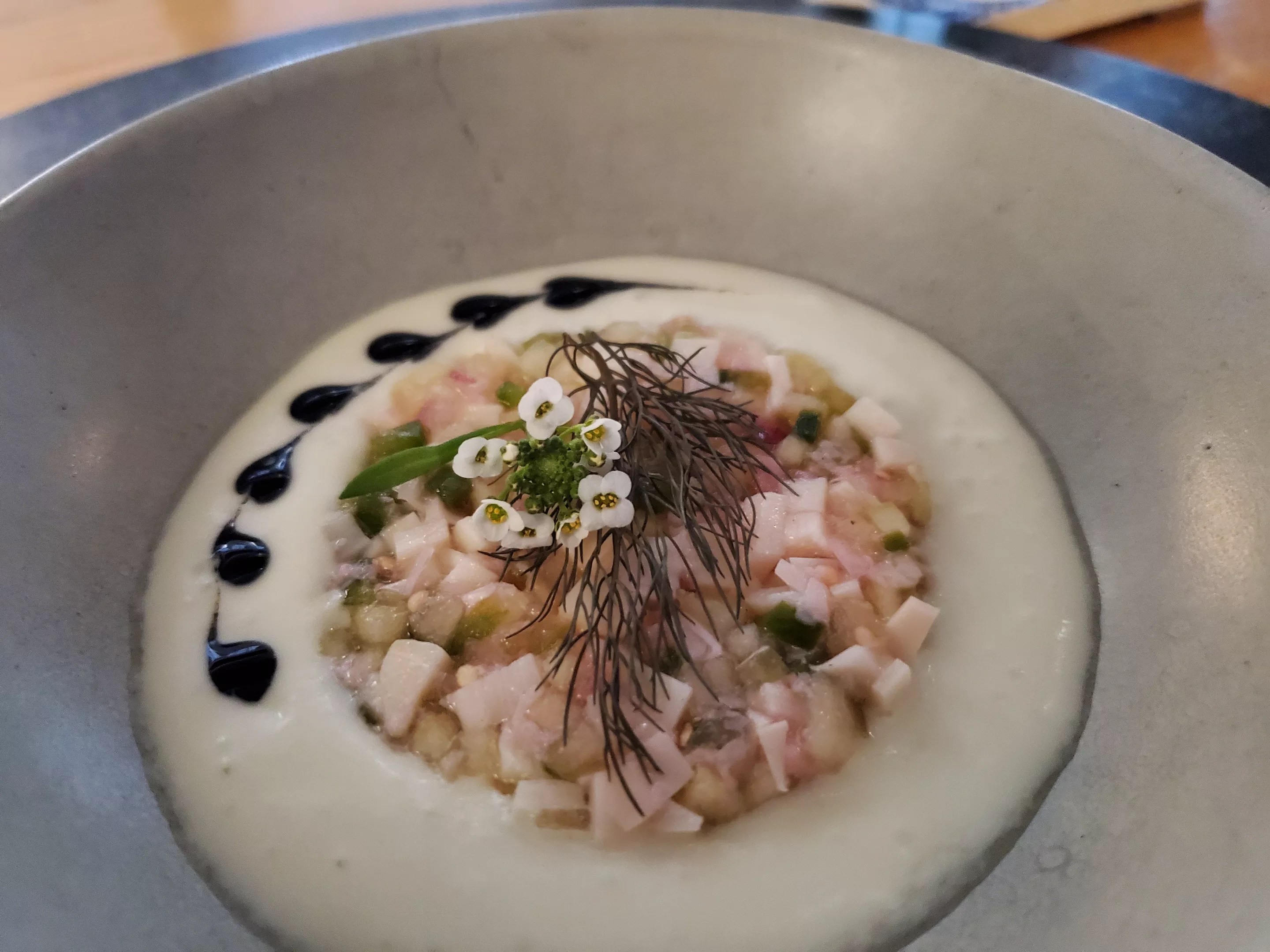
Molly Martin

Audio By Carbonatix
Editor’s note: This story was originally published on May 2, 2023, before it was announced that Michelin would be releasing a Colorado guide. On September 12, Bruto and its sister restaurant The Wolf’s Tailor were among the five Colorado restaurants to earn one Michelin star, as well as green stars for excellence in sustainability practices.
Glass jars filled with corn, a chile library and shelves lined with colorful pickling and fermentation projects can all be seen by diners at the seventeen-seat chef’s counter at Bruto. “I treat the restaurant like my laboratory,” says executive chef Michael Diaz de Leon.
During service, one chef mans the hearth, a large, wood-burning stove in which everything at the small eatery located inside Free Market at the Dairy Block is cooked. Another gently plates ceviche made from hearts of palm onto a cloud-like white pool made with coconut milk.
As the meal continues and various courses are composed and served in waves, the atmosphere is calm – almost meditative and completely relaxed, despite the obviously well-thought-out coordination of the team. This is fine dining, but there are no white chef’s coats or stiff tablecloths in sight, and nothing about the experience is stuffy.
“Go ahead and pick it up with your hands,” Diaz de Leon says after dropping off a sope made with masa that is milled in-house, a process the chef says took eight months to perfect. “You’ll always see a masa course on the menu, because we want to celebrate that story.”
“What makes chile Colorado different from mole?” asks one diner after being served a raviolo filled with smoked mushrooms and queso fresco in the deeply flavored sauce inspired by the classic dish from northern Mexico.
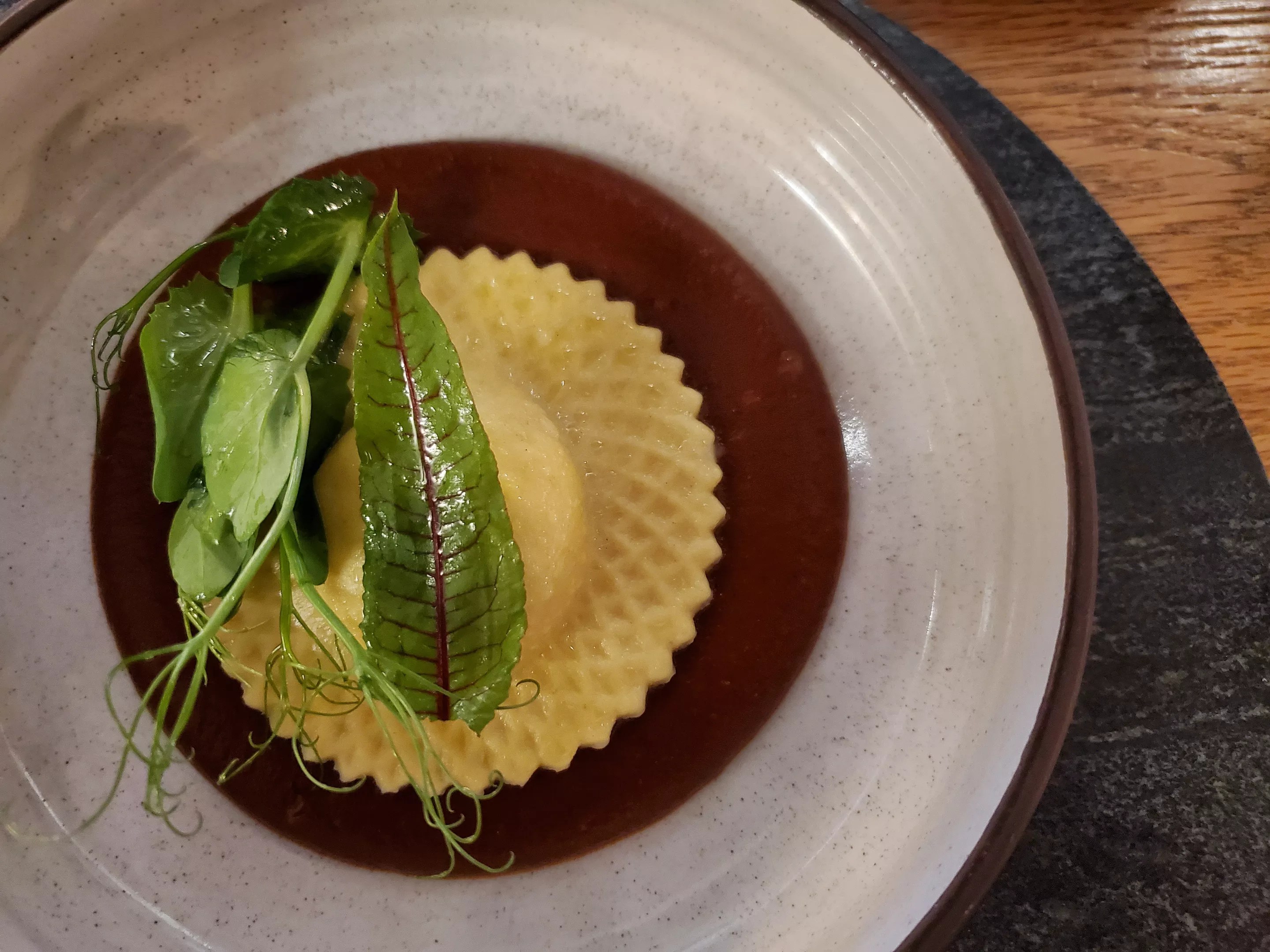
A raviolo filled with smoked mushrooms and queso fresco, served over chile Colorado.
Molly Martin
“It’s a regional thing,” says Diaz de Leon. The word “mole” isn’t used in that part of the country, he explains, and chile Colorado doesn’t include elements like seeds and nuts, which are typically found in moles.
Asking questions is part of the dining experience at this tasting-menu restaurant, where the meal is usually seven courses and lasts about two hours, for a price tag that hovers just over $100 per person. (You can also add on beverages, including cocktails, wine and N/A options, which are available Á la carte or as coursed pairings.)
Having fun is part of the deal, too, as is the promise of many culinary surprises. “We celebrate Mexican regional food because that’s where my parents are from, but we’re taking influences from all over the world,” Diaz de Leon says.
With winter turning to spring, a slice of bison tenderloin is served with the first ramps of the season, paired with a wine from Texas. The raviolo course, which blends Italian and Mexican cuisine, is served with soft, chewy, charred bread paired with a French/Indian-inspired vadouvan butter. One cocktail combines the Mexican spirit sotol with Greek yogurt. The dessert course, a memorable Spanish-style Basque cheesecake, is made using miso.
It’s all downright delicious. But it’s taken a lot of work to get to this place. “All this gray hair, it’s just from the last two years,” Diaz de Leon jokes. In truth, he’s been serious about cooking since he was a kid.
Both of Diaz de Leon’s parents are from Mexico; he was born in El Paso. When he was five, his family moved to Colorado; he attended elementary, middle and one year of high school in Denver before returning to Texas. By then, he’d already developed a passion for the culinary world. “I grew up in a very food-centric environment. My mom cooked all the time, my aunts cooked, my grandma cooked. I always loved what food did, just bringing people together at a table,” he recalls.
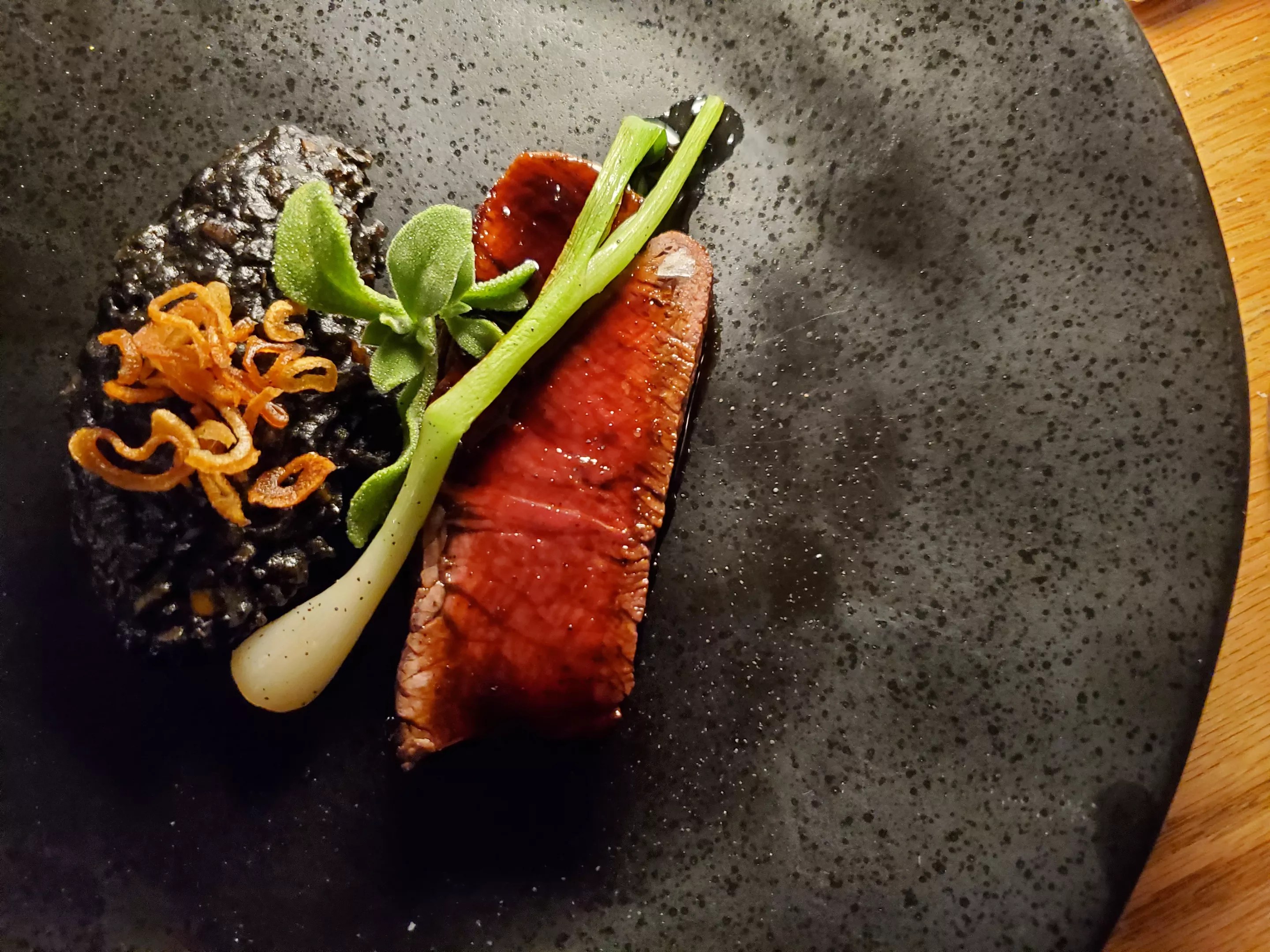
Bison tenderloin with the first ramps of the season, served with black rice.
Molly Martin
But when he landed his first job as a dishwasher and line cook at a Southern eatery in El Paso, “I was so bad at cooking, I thought I was gonna get fired,” he says. “They would only let me dredge chicken, and I was always getting yelled at. But I just kept going back. And eventually it got easier, and I got better.”
As his career progressed, he was hired as chef de cuisine at an El Paso concept that was still being built, Taft Diaz. While construction was underway, he had the opportunity to stage for two months at Pujol, a world-renowned restaurant in Mexico City. “It really showed me where the level and standard is, as far as how we should conduct ourselves as professionals,” Diaz de Leon says. “Before that, I was just a shitbag. I thought I knew everything. It really humbled me.”
After returning from Mexico, he noticed a trend in fine dining in this country: a lot of food waste. “That’s a problem for me,” he recalls thinking – one that led him to the world of fermentation. “I started with kombucha and lacto-fermented vegetables, and from there, my brain was just going crazy,” he says.
Eventually, though, he admits that he “hit a plateau in El Paso, financially and with my career.” So in 2019, he landed a job in Denver, as the sous chef for Justin Brunson’s Old Major. But just four months later, the pandemic hit, and Brunson ultimately opted to shutter the LoHi eatery for good.
Because he’d been working in Colorado for such a short time, Diaz de Leon wasn’t eligible for unemployment, and he’d just signed a lease. “I didn’t really know anyone here, food-wise, and restaurants weren’t hiring,” he says. So when Brunson offered him the opportunity to work at his sandwich counter inside Leevers Locavore, Diaz de Leon took it.
While he had a paycheck coming in, he “didn’t have an outlet” for the kind of cooking he really wanted to do, he recalls, so he “homed in on fermentation, because that’s all I could do. My house was just jars everywhere.”
During this time, he also began hosting dinners at his home, which is how he ended up connecting with chef Kelly Whitaker, co-founder of Id Est Hospitality, the restaurant group behind the Wolf’s Tailor, Basta, the Dry Storage bakery and mill, and Bruto, which had debuted in September 2019.
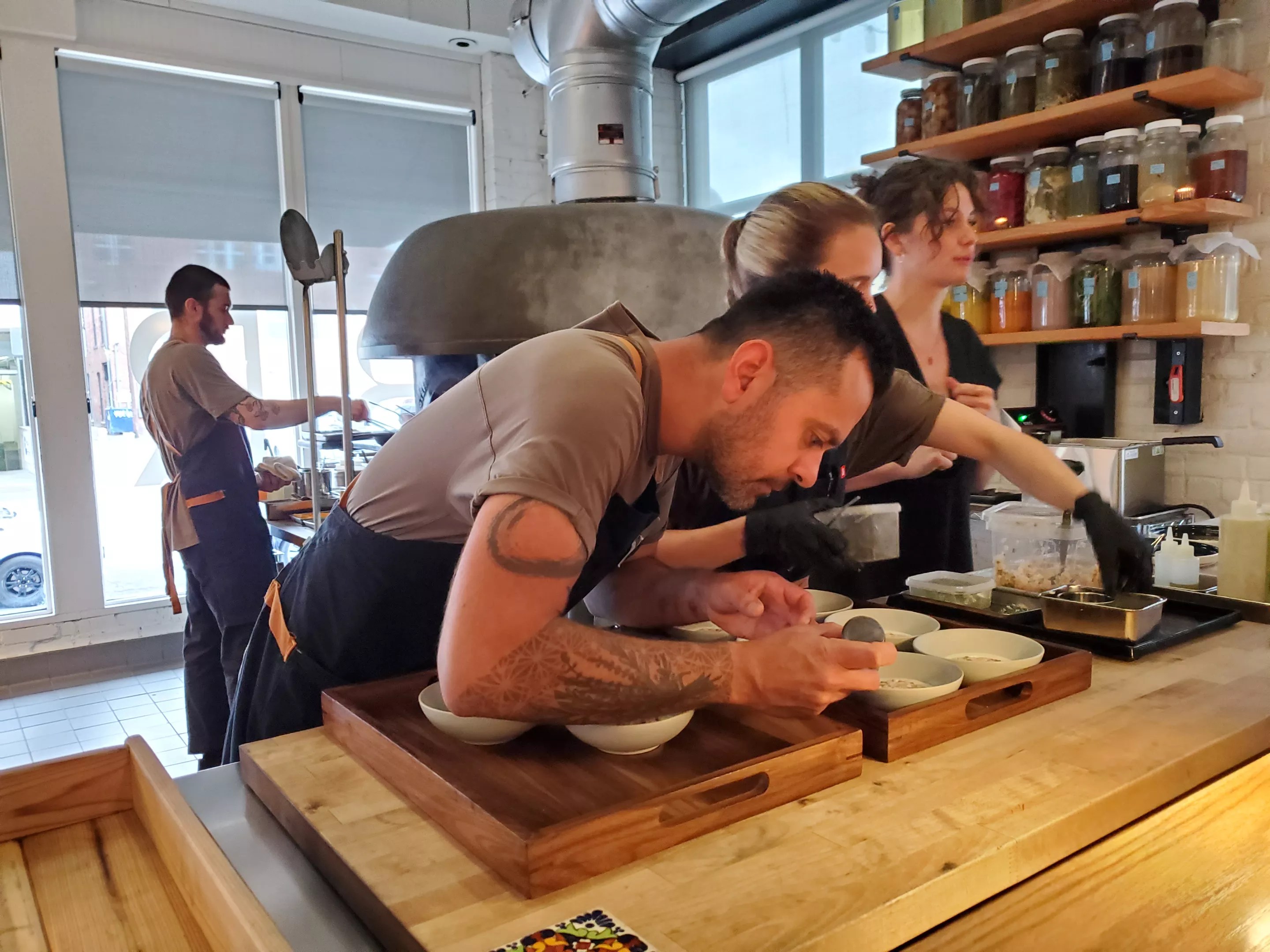
Michael Diaz de Leon is a leader in his kitchen and in the Colorado culinary scene.
Molly Martin
Diaz de Leon soon staged at Wolf’s Tailor. “Kelly said, ‘Oh, you like, cook cook,'” he remembers. After doing a series of successful taco omakase pop-ups out of Bruto, he struck a deal with Whitaker to take over the restaurant, a role that started officially in November 2020.
“We did four or five services, and then the city shut us down again because of the pandemic,” Diaz de Leon says. To make it through, he and his team set up BOH, which stands for back-of-house, in the alley, where they sold Á la carte items like tacos, ceviche and margaritas.
“It’s what kept us going until we were able to reopen,” he says. “For about a year I ran both, but it started to become a distraction from where I really wanted to be. So we sublet the BOH space to Westbound & Down, and then I was able to focus on Bruto and what I really want to do with my food. That’s when my fermentation program skyrocketed.”
At Bruto, the rule is to “never put anything in the trash,” Diaz de Leon says. “Pickle it, ferment it or compost. It’s just a more responsible way to cook.” Fermentation is a big part of Id Est as a whole – the group even has its own director of fermentation, Mara King. Diaz de Leon says he bounces ideas around with her every week, and he’s always working on new concepts, including ways to use the grain that is so central to Bruto’s fare: corn. Think corn soy sauce, corn mirin, corn miso and corn garam.
That passion for fermenting has spread to his team. “Now they’re doing all their own projects,” Diaz de Leon says. “Hopefully, it inspires them, and when they move on from Bruto, they’ll take that knowledge and apply it, and essentially, we become a more sustainable city when it comes to food.”
The restaurant doesn’t use any of the big distributors, either, instead focusing on forging strong relationships with local farmers. “We are trying to be as resourceful as we can with what we have in Colorado,” notes Diaz de Leon. Bruto also gives 1 percent of its sales to Zero Foodprint, a nonprofit based in California that gives back to farmers to support regenerative agriculture. “It’s our responsibility as restaurants and chefs to care,” he says.
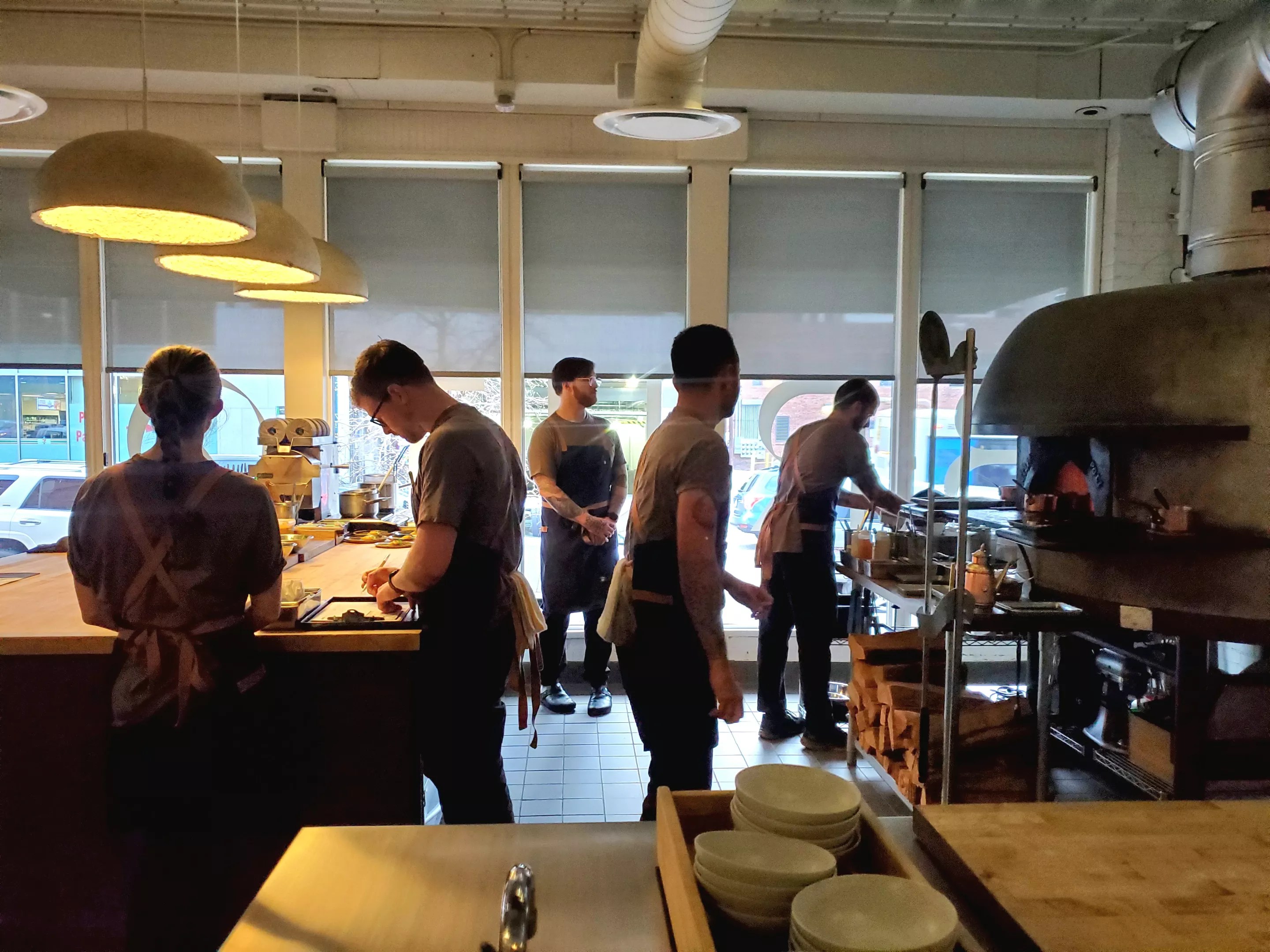
The tight-knit team at Bruto works together seamlessly.
Molly Martin
“My aspirations are to open a bigger Bruto. I want to take it to its wildest dreams,” he continues, adding that he envisions that happening in two to three years – and he plans to do it in the Mile High. “I really do love Denver. Denver is my home. I want it to be up there with the L.A.s and the Chicagos and the Miamis and the New Yorks. … What really makes Denver special is the community of chefs that work here. Everybody does their best, and we all respect each other. And we need that, because we’re such a young food city in a way, in regard to having the platform now. It’s gonna require all of us to really band together to get the recognition from bigger cities.”
That platform includes the James Beard Awards. “I’ve been dreaming about this since I started cooking,” Diaz de Leon says of being named a 2023 finalist. “I knew what I wanted, and I knew it would eventually come; I just didn’t think it would come this quick. I was putting my head down, and I was just focusing on the food. As long as every night our guests leave happy, the work will get recognized eventually. So to achieve that goal, it’s amazing. Not only for me, but for the staff that works so hard.”
Next up, he says, is getting the Michelin Guide to come to Denver. “It’s just a matter of time,” he insists. “It’s going to take more than Bruto to do that, so if we can be the springboard, it’s an opportunity for us to drive the next generation of chefs.”
But in the meantime, he’s going to continue focusing on the food. He and his team are already planning up to a year ahead, with fermentation projects in the works that will be used in 2024. Soon the menu at Bruto will shift to spring, highlighting lamb. In the summer, Colorado produce will be the focal point, before bison makes a comeback in the fall and winter.
Accolades aside, Diaz de Leon is proud of his achievements and excited for what the future holds. “I do this for bigger reasons than awards,” he concludes. “I didn’t before. I was always chasing the carrot, and now I have the carrot. So what are you gonna do with the carrot? I’m gonna ferment it and make miso out of it.”